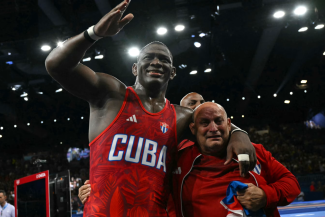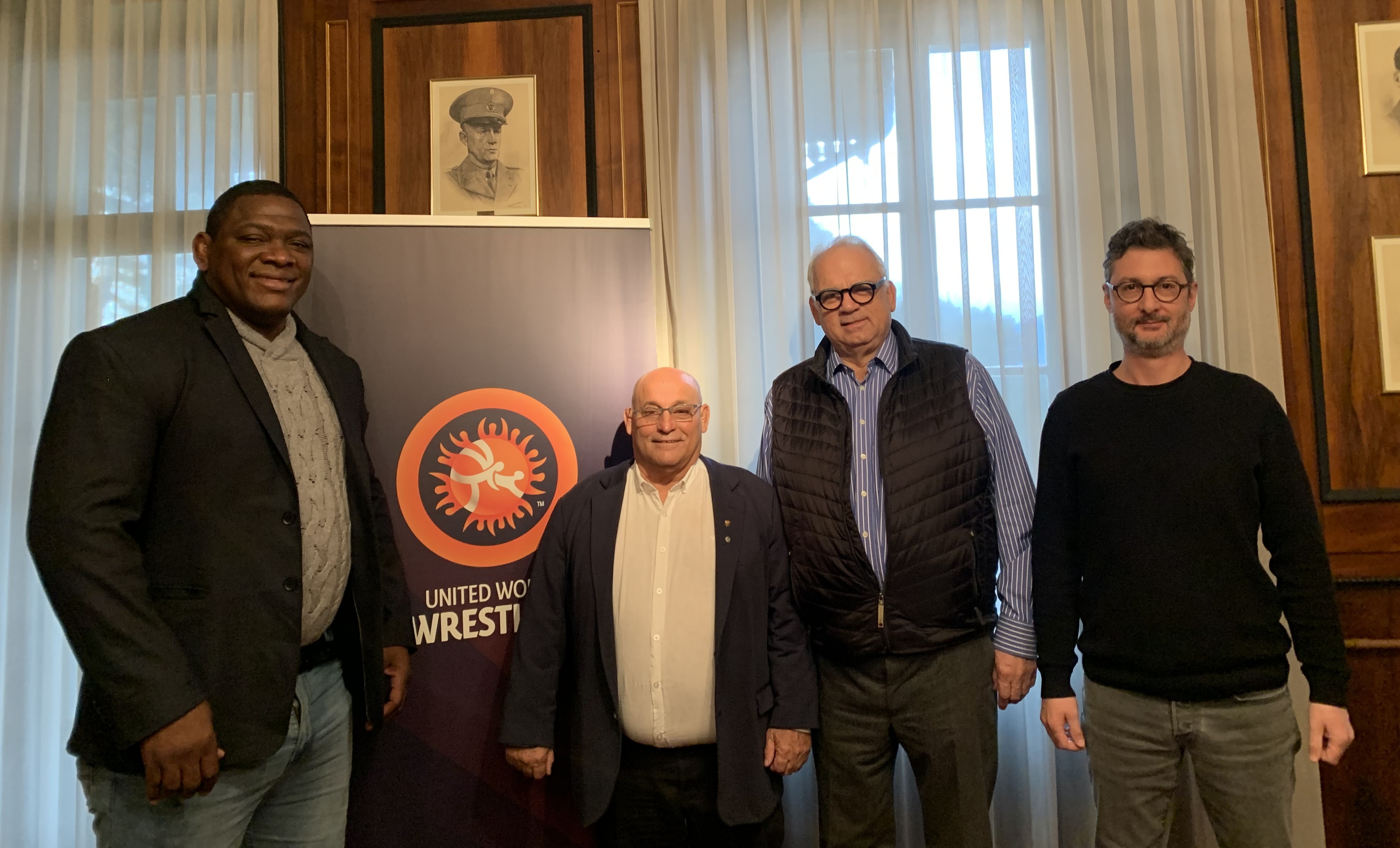Updated Grand Prix Zagreb Open Entry List
Wednesday, January 13, 2021 - 18:07 By Eric Olanowski

ZAGREB, Croatia (January 13) -- For the first time since the Nur-Sultan World Championships, two-time world champion Zhan BELENIUK (UKR) will make his long-awaited return to the mat. The Rio Olympic runner-up and Ukrainian Parliamentary member will kick off his '21 campaign later this week at the Grand Prix Zagreb Open, which gets underway January 16-17 in Zagreb, Croatia's Dom Sportova Hall.
Beleniuk is apart of a loaded competition list that'll feature 165 athletes from 18 different nations. In addition to Beleniuk, other starts to keep an eye on are:
60kg: Stig Andre BERGE (NOR): Rio Olympic bronze medalist
60kg: Victor CIOBANU (MDA): '18 world silver medalist
63kg: Elmura tTASMURADOV (UZB): Rio Olympic bronze medalist
67kg: Morten THORESEN (NOR): '20 European champion
67kg: Gevorg SAHAKYAN (POL): '18 world bronze
77kg: Daniel CATARAGA (MDA): Two-time U23 world champion // '16 world silver medalist
82kg: Rajbek BISULTANOV (DEN): Two-time European champion
82kg: Alex KESSIDIS (SWE): '19 world silver medalist
97kg: Felix BALDAUF (NOR): '17 European champion
Reigning Zagreb Open champions that are entered:
67kg: Donior ISLAMOV (MDA)
77kg: Daniel CATARAGA (MDA)
87kg: Oskar JOHANSSON (SWE)
55kg
Steven ECKER (GER)
Fabian SCHMITT (GER)
Giovanni FRENI (ITA)
Artiom DELEANU (MDA)
Snorre LUND (NOR)
Jasurbek ORTIKBOEV (UZB)
Ilkhom BAKHROMOV (UZB)
60kg
Ivan LIZATOVIĆ (CRO)
Luka PRIHISTAL (CRO)
Juuso LATVALA (FIN)
Jacopo SANDRON (ITA)
Justas PETRAVICIUS (LTU)
Micha TRACZ (POL)
Dawid ERSETIC (POL)
Alexander BICA (SWE)
Ardit FAZLIJA( SWE)
Ahmet UYAR (TUR)|
Islomjon BAKHRAMOV (UZB)
Mukhammadkodir YUSUPOV (UZB)
Firuz TUKHTAEV (UZB)
63kg
Dominik CELIČEK (CRO)
Andrej GINC (GER)
Deniz MENEKSE (GER)
Giovanni Paolo ALESSIO (ITA)
Andrea SETTI (ITA)
Edgaras VENCKAITIS (LTU)
Victor CIOBANU (MDA)
Stig Andre BERGE (NOR)
Perica DIMITRIJEVIĆ (SRB)
Niklas OHLEN (SWE)
Elmura tTASMURADOV (UZB)
67kg
Elmer MATTIL (FIN)
Witalis LAZOVSKI (GER)
Steve MOMILIA (ITA)
Francesco BELLINO (ITA)
Ruben MARVICE (ITA)
Donior ISLAMOV (MDA)
Valentin PETIC (MDA)
Morten THORESEN (NOR)
Mateusz BERNATEK (POL)
Gevorg SAHAKYAN (POL)
Roman PACURKOWSKI (POL)
Daniel SOINI (SWE)
Andreas VETSCH (SUI)
Enes BAŞAR (TUR)
Haci KARAKUŞ (TUR)
Ime NASIBOV (UKR)
Makhmud BAKHSHILLOEV (UZB)
Mirzobek RAKHMATOV (UZB)
72kg
Marko NIKOLIĆ (CRO)
Akseli YLI-HANNUKSELA (FIN)
Mikko PELTOKANGAS (FIN)
Idris IBAEV (GER)
Kristupas SLEIVA (LTU)
Titas KERSEVICIUS (LTU)
Mihai PETIC (MDA)
Sebastian AAK (NOR)
Aron PINTER (SRB)
Didrik SILVERIN (SWE)
Michael PORTMANN (SUI)
Ahmet YILMAZ (TUR)
|Aram VARDANYAN (UZB)
77kg
Božo STARČEVIĆ (CRO)
Pavel PUKLAVEC (CRO)
Antonio KAMENJAŠEVIĆ (CRO)
Oldrich VARGA (CZE)
Jakub BIELESZ (CZE)
Matias LIPASTI (FIN)
Roni PUROLAINEN (FIN)
Michael WIDMAYER (GER)
Luca DARIOZZI (ITA)
Riccardo Vito ABBRESCIA (ITA)
Ciro RUSSO (ITA)
Matteo MAFFEZZOLI (ITA)
Paulius GALKINAS (LTU)
Daniel CATARAGA (MDA)
Alexandrin GUTU (MDA)
Per Anders KURE (NOR)
Edgar BABAYAN (POL)
Mateusz WOLNY (POL)
Iwan NYLYPIUK (POL)
Dawid KLIMEK (POL)
Albin OLOFSON(SWE)
Lukas AHLGREN (SWE)
Nicolas CHRISTEN (SUI)
Fabio DIETSCHE (SUI)
Furkan BAYRAK (TUR)
Vladimir YAKOVLEV (UKR)
Yasaf ZEINALOV (UKR)
Yaroslav FILCHAKOV (UKR)
Elmar NURALIEV (UKR)
Jalgasbay BERDIMURATOV (UZB)
82kg
Filip ŠAČIĆ (CRO)
Antun BORČIĆ (CRO)
Vjekoslav LUBURIĆ (CRO)
Rajbek BISULTANOV (DEN)
Hannes WAGNER (GER)
Marius BRAUN (GER)
Simon OLLINGER (GER)
Arminas LYGNUGARIS (LTU)
Magnus GRONVIK (NOR)
Alex KESSIDIS (SWE)
Marc WEBER (SUI)
87kg
Tomislav HADER (CRO)
Filip SMETKO (CRO)
Matej MANDIĆ (CRO)
Petr NOVAK (CZE)
Turpal BISULTANOV (DEN)
Vili ROPPONEN (FIN)
Juho PAHIKAINEN (FIN)
Ilias PAGKALIDIS (GRE)
Simone FIDELBO(ITA)
Veronica PARISI (ITA)
Mirco MINGUZZI (ITA)
Julius MATUZEVICIUS (LTU)
Martynas NEMSEVICIUS (LTU)
Eividas STANKEVICIUS (LTU)
Gabriel LUPASCO (MDA)
Vladislav GUTU (MDA)
Aleksandar ST JEPANETIC (SWE)
Oskar JOHANSSON (SWE)
Zakarias BERG (SWE)
Ramon BETSCHART (SUI)
Dogan GÖKTAŞ (TUR)
Ali CENGIZ (TUR)
Zhan BELENYUK (UKR)
Joe RAU (USA)
97kg
Ivan RATKOVIĆ (CRO)
Nikola CONAR (CRO)
Artur OMAROV (CZE)
Ondrej DADAK (CZE)
Mathias BAK (DEN)
Elias KUOSMANEN (FIN)
Arvi SAVOLAINEN (FIN)
Ilja KLASNER (GER)
Patrick NEUMAIER (GER)
Jan ZIRN (GER)
Laokratis KESIDIS (GRE)
Luca SVAICARI (ITA)
Nikoloz KAKHEKASHVILI (ITA)
Vilius LAURINAITIS (LTU)
Felix BALDAUF (NOR)
Marcus WORREN (NOR)
Tadeusz MICHALIK (POL)
Pontus LUND (SWE)
Christian ZEMP (SUI)
Damian VON EUW (SUI)
Ibrahim TIGCI (TUR)
Dzihasov ZIELIMKHAN (UKR)
Vladlen KOZLIUK (UKR)
Jahongir TURDIEV (UZB)
130kg
Stepan DAVID (CZE)
Konsta MAENPAA (FIN)
Jello KRAHMER (GER)
Franz RICHTER (GER)
Samuele VARICELLI (ITA)
Mantas KNYSTAUTAS (LTU)
Romas FRIDRIKAS (LTU)
Oskar MARVIK (NOR)
Rafał KRAJEWSKI (POL)
Delian ALISHAHI (SUI)
Osman YILDIRIM (TUR)
Muhammet Hamza BAKIR (TUR)
Aleksander CHERNETSKI (UKR)
Nikolai KUCHMIY (UKR)
Muminjon ABDULLAEV (UZB)



Share your thoughts.
Comments